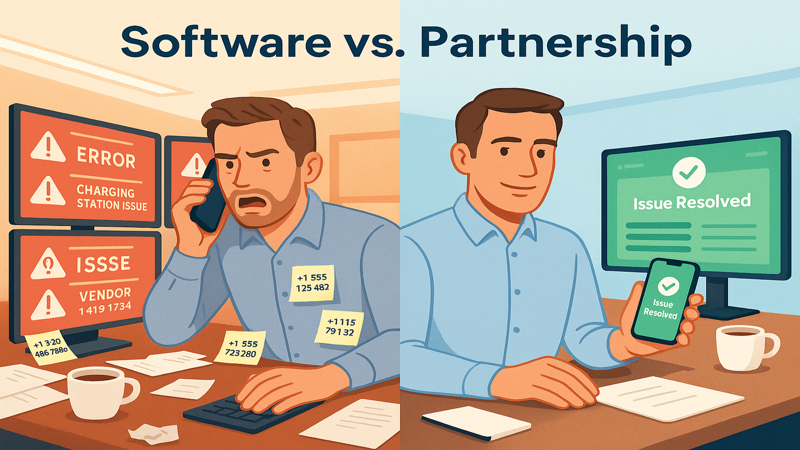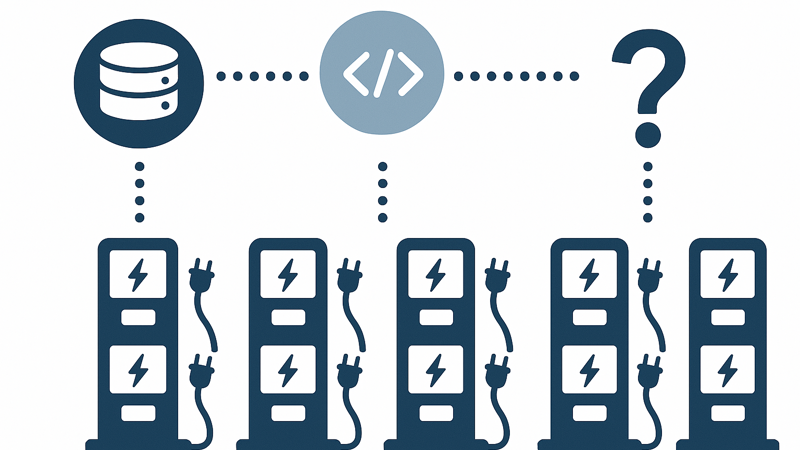
Should I buy an electric car?
So, you’re thinking of buying an electric car. With so much conflicting information out there, it can be hard to filter what’s true about EVs and what isn’t.
In this blog, we’ll look to provide clarity on what the real issues are. Call us biased, but we’re an EV charging software company. So (spoiler alert) our short answer is yes, you should buy an electric car. But we’ll do our best to discuss some of the biggest sticking points for switching to electric at the moment, and provide some genuine insight as to why we think they’re worth the investment.
Why buy an electric car: the most common reasons
If you’re interested in an EV, chances are you’re already familiar with some of the key arguments for purchasing an electric vehicle. But, to recap, some of the main reasons are:
- Environmental: Switching to an EV offers a huge reduction to your carbon footprint. With 37 billion tons of carbon emissions coming from transportation each year, the drive to make greener changes wherever possible is a strong motivator to consider switching.
- Economic: EVs are significantly cheaper to fuel than petrol and diesel cars. EVs offer long-term fuel savings, with cheaper electricity available using at-home chargers.
- The vehicles: Simply put, EVs are great fun. Motorheads can be won over by features like instant torque, and the uniqueness of what the electric car brings can be a huge drawer in itself.
Electric car issues: how valid are they?
It’s no secret that moving to EVs has some common criticisms. But are they worth listening to? How much do they really affect the average EV driver? Let’s break them down.
Upfront Cost
When it comes to outright cost we can’t get away from the obvious; EVs are more expensive than the typical ICE model. But they’re also not quite as expensive as you’d think.
EV charging software features like charge scheduling mean you’re able to drive down the running cost of your EV by making the most of off-peak energy tariffs when charging at home.
Besides offering significant savings post-purchase, a lot of people would be surprised at just how cheap you can purchase second-hand EVs with more recent manufacturing dates than used ICE cars.
Just through a quick Google search, I was able to find multiple listings for used 2020-plate Renault Zoe’s with around 30-40 thousand miles on the clock at around the £10,000 mark. And with great reviews too! Add to that the game-changing announcement of the sub £15,000 Dacia Spring, and we can already see EV pricing starting to compete with ICE equivalents. And it’s only going to get better.
Range and Charge Anxiety
Range and charge anxiety refers to the fear of an EV having enough power to make it to the destination, and not being able to access chargers when using the public network, and so getting caught stranded out on the road.
Some argue limited battery range and a lack of availability/convenience on the public network make EVs an unreliable and unrealistic option for the average driver to make the switch. And they may, to some extent, be right.
But with the average range of EVs coming in at around 200 miles, and statistics clocking our average journey length at under ten miles, do range and charge anxiety represent more of a perception of a problem than an actual problem in itself?
With industry advancements in EV Roaming, the 53,000 charging points currently available on the UK public network are becoming increasingly available through a single app or RFID card.
Targets have been set for the delivery of 300,000 public chargers in the UK in total by 2030, and increasingly promising news is emerging on the development of batteries with better range options. With the current pace of change, it’s not a stretch to say that range and charge anxiety will soon become - and perhaps already is - a thing of the past.
Long charging times
Most EVs charge to a full battery within 2-4 hours on a standard 22kW fast charger. This can be considered a nuisance, for sure. But is it really that bad?
A recent ZapMap survey showed that 80% of charging is done at home. Pair that with the typical less than ten-mile journey as the UK average, and it seems that the majority should remain relatively unaffected by slow charging times.
For those of us who own a driveway or private parking place, installing your own EV charger means you can restore your vehicle to full charge every night. Now that might be at a 7kW rate (typically a four-hour charge), but that leaves hours of availability each night for charging on a typical 9-5 schedule.
Away from home charging, forecourts are also opening up and down the country. Common places offering opportunities to top up your charge include shopping centres, cinemas, supermarkets, restaurants, cafe’s etc. Making use of multiple charges when you’re out and about means your battery stays topped up, and charging won’t feel like such a long wait.
Hybrids
Finally, we come to hybrids. Combining parts of the electric and ICE equivalents, hybrids are often seen as the in-between, an intermediary worth switching to while the problems with our EV charging infrastructure are sorted, and in the wait for prices for new electrics to dip.
But in truth, industry experts are already forecasting the downfall of the plug-in hybrid.
In reality, the primary reason for the existence of plug-in hybrids is the concern about making the full switch to electric. And we get it. The petrol element can offer a comforting safety blanket in case you exceed your vehicle’s electric range, and ease fears of having to find a charge on the public network.
Yet PHEVs are repeatedly dealing with claims that hybrids aren't having the emission-saving impact we once thought, and they’re often accused of combining some of the worst elements of both ICE and EV cars, not the best.
Considering the extra fuel costs incurred by carrying heavy batteries with limited range, to us, it just makes more sense to us to opt for their full electric counterparts to enjoy the full EV benefits.
EV driver apps: how they can help
There seems to be a misconception among drivers yet to make the EV switch that once you’ve done so, you’re on your own. Commonly, the mainstream media coverage of EV driver apps highlights issues users have had. But in reality, apps are there to provide as much support as possible for EV drivers in getting a charge.
Most apps come with 24/7 support lines manned by industry specialists, dedicated to resolving any issues you may find at the ‘pump’. In reality, these apps run off the customer recommendations they receive - so providing the best service possible is without a doubt not only in their best interest but a key priority in their business model.
EV driving is scary and isolating, and those without expert knowledge will find themselves up a creek sans paddle.
With UK Government regulations targeting a mandated level of customer service across the board, the truth is that this is far from the case, and customer service in particular is rapidly improving. So it’s not necessarily a valid reason to avoid the transition in its own right.
Is an electric car really worth it?
So that brings us to our final verdict.
If it wasn’t already clear from this blog’s introduction, we believe that the answer is yes!
But we’re not deluded or ignorant of the issues, we simply know there is evidence that they needn't be barriers. Here are the clear key arguments why you should consider a switch to electric now:
Prohibitive Cost: Many industry experts are predicting a manufacturer price war in 2024, and there are a ton of cheaper secondhand options built to last, and cheaper new options set to come. Once you have the vehicles, there are a ton of money-saving tricks to keep running costs way down.
Charge Anxiety: As with any mass rollout of a (relatively) new technology, there are bound to be hitches along the road. But we think the industry is doing enough to tackle issues around range and availability anxiety. With 300,000 chargers promised on the public network, home charging a viable option for many, and the average journey being far, far below the average EV range, we think availability issues aren’t quite as limiting as they may seem.
Long charging times: The idea of having to wait for hours at a time to charge up an EV is again more of a problem in theory than in practice. Simple steps like home charging and regular top-ups on the public network mean that unless you’re travelling huge distances in one go (200 miles plus), you’re unlikely to have to wait to get a full charge. The rest of your charging can be done passively.
Hybrid options: With half the EV, you get half the benefits. Carrying a battery and engine severely reduces your car's range, and the environmental and economic advantages of making the switch are severely dampened by choosing a hybrid over the full EV. To us, it’s an intermediate compromise that at best works as a stepping stone to EVs, not a substitute.
We hope you’ve found this blog useful in answering the question of whether you should buy an electric car. We think 2024 is as good a time to buy an EV as ever. And if you do so, you’re going to want home charging whenever possible.
In that case, setting yourself up with free home charging software is the best way to make sure you’re getting the most from your investment, and making your ordinary charge experience extraordinary.
To register your interest in our home EV charging software, fill out the contact form below and a member of our team will be in touch.


